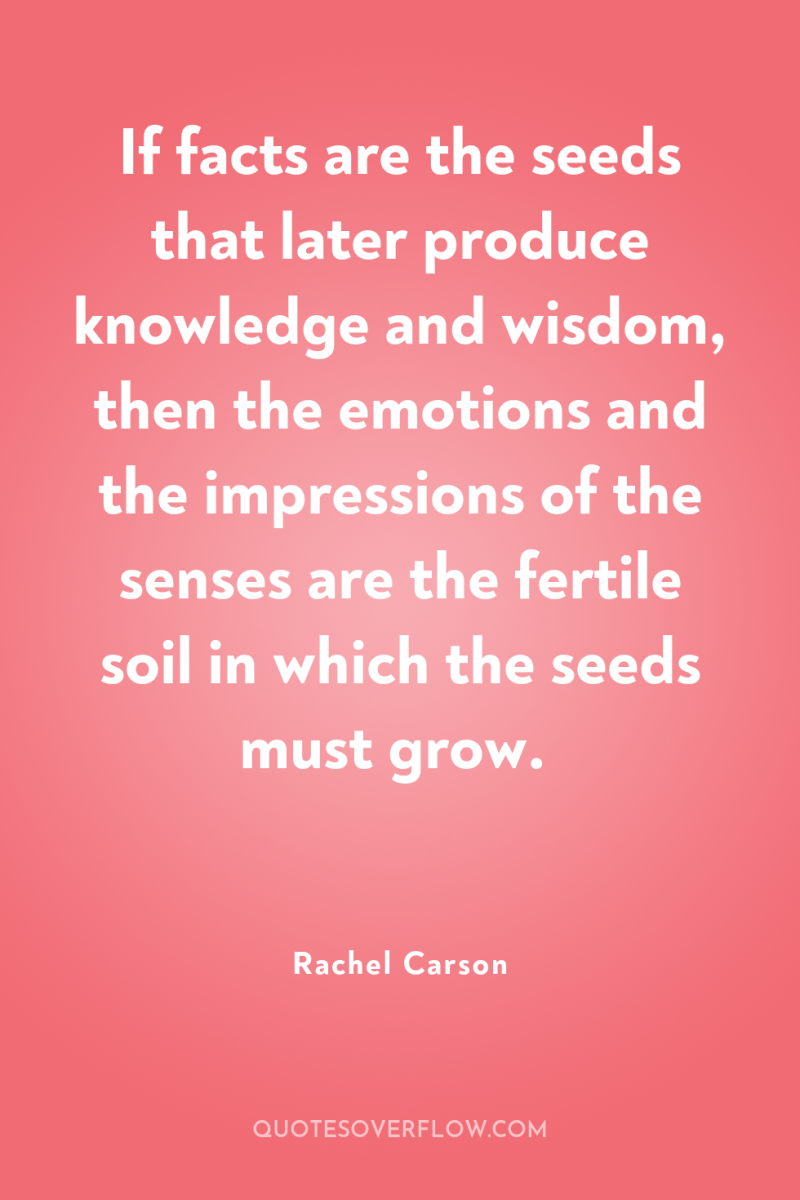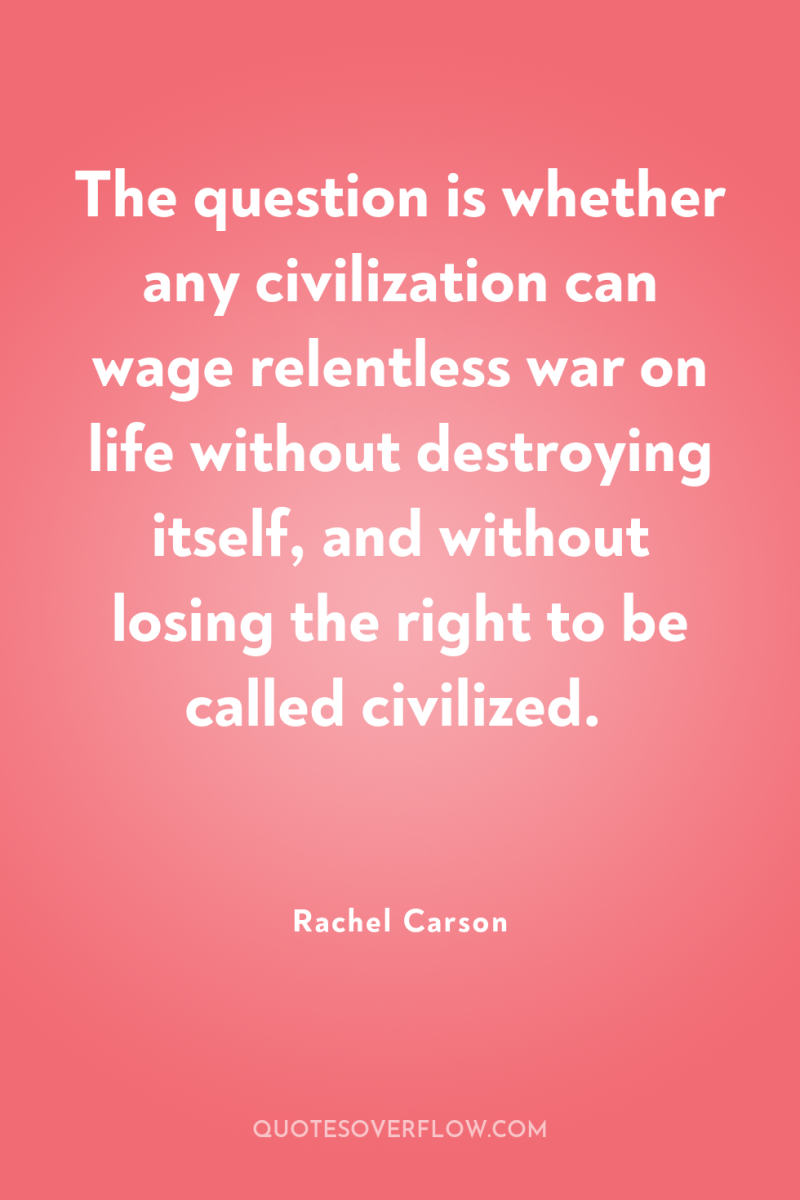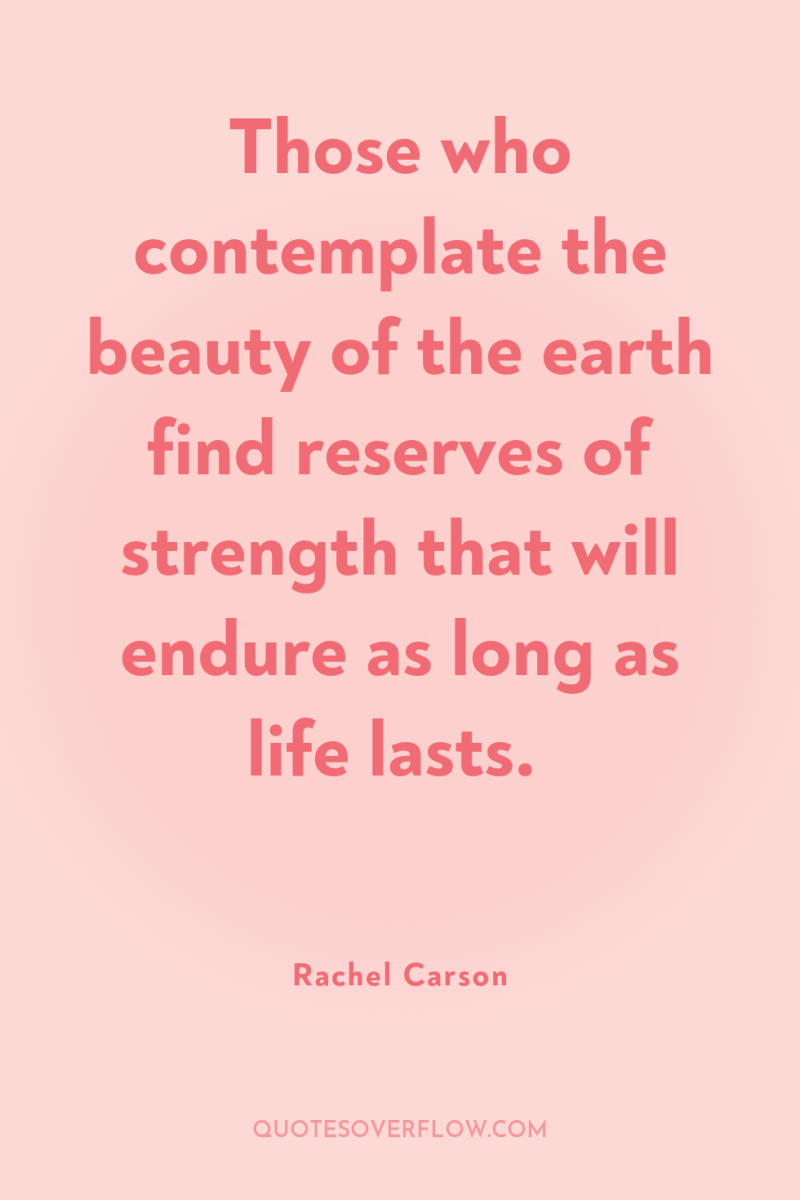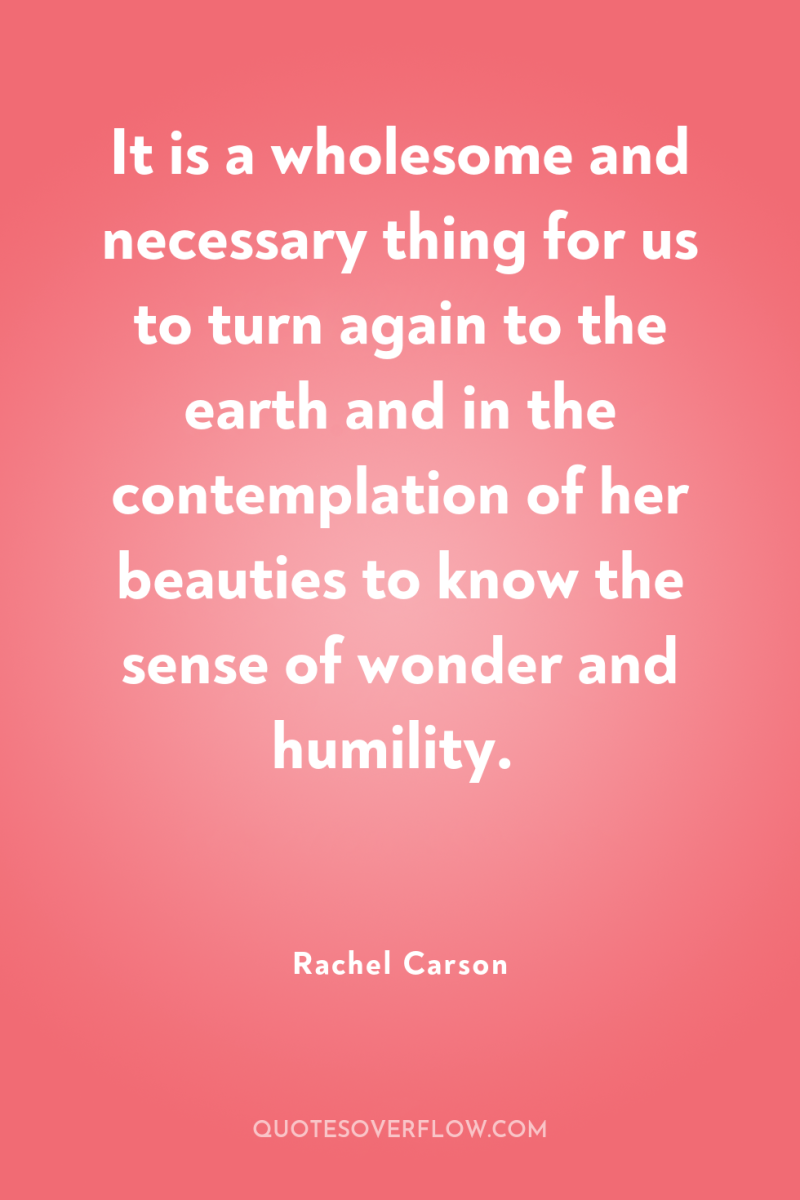It is a curious situation that the sea, from which life first arose should now be threatened by the activities of one form of that life. But the sea, though changed in a sinister way, will continue to exist; the threat is rather to life itself.Rachel Carson
The aim of science is to discover and illuminate truth. And that, I take it, is the aim of literature, whether biography or history... It seems to me, then, that there can be no separate literature of science.Rachel Carson
The winds, the sea, and the moving tides are what they are. If there is wonder and beauty and majesty in them, science will discover these qualities... If there is poetry in my book about the sea, it is not because I deliberately put it there, but because no one could write truthfully about the sea and leave out the poetry.Rachel Carson
Those who contemplate the beauty of the earth find reserves of strength that will endure as long as life lasts. There is something infinitely healing in the repeated refrains of nature -- the assurance that dawn comes after night, and spring after winter.Rachel Carson

If facts are the seeds that later produce knowledge and wisdom, then the emotions and the impressions of the senses are the fertile soil in which the seeds must grow.Rachel Carson
With these surface waters, through a series of delicately adjusted, interlocking relationship, the life of all parts of the sea is linked. What happens to a diatom in the upper, sunlit strata of the sea may well determine what happens to a cod lying on a ledge of some rocky canyon a hundred fathoms below, or to a bed of multicolored, gorgeously plumed seaworms carpeting an underlying shoal. or to a prawn creeping over the soft oozes of the sea floor in the balckness of mile-deep water.Rachel Carson
The more clearly we can focus our attention on the wonders and realities of the universe about us the less taste we shall have for the destruction of our race. Wonder and humility are wholesome emotions, and they do not exist side by side with a lust for destruRachel Carson

The question is whether any civilization can wage relentless war on life without destroying itself, and without losing the right to be called civilized.Rachel Carson
Until we have the courage to recognize cruelty for what it is... we cannot expect things to be much better in this world... We cannot have peace among men whose hearts delight in killing any living creature. By every act that glorifies or even tolerates such moronic delight in killing we set back the progress of humanity.Rachel Carson
I like to define biology as the history of the earth and all its life – past, present, and future. To understand biology is to understand that all life is linked to the earth from which it came; it is to understand that the stream of life, flowing out of the dim past into the uncertain future, is in reality a unified force, though composed of an infinite number and variety of separate lives.Rachel Carson
A Who's Who of pesticides is therefore of concern to us all. If we are going to live so intimately with these chemicals eating and drinking them, taking them into the very marrow of our bones - we had better know something about their nature and their power.Rachel Carson

Those who contemplate the beauty of the earth find reserves of strength that will endure as long as life lasts.Rachel Carson

It is a wholesome and necessary thing for us to turn again to the earth and in the contemplation of her beauties to know the sense of wonder and humility.Rachel Carson
For most of us, knowledge of our world comes largely through sight, yet we look about with such unseeing eyes that we are partially blind. One way to open your eyes to unnoticed beauty is to ask yourself, "What if I had never seen this before? What if I knew I would never see it again?Rachel Carson
A child’s world is fresh and new and beautiful, full or wonder and excitement. It is our misfortune that for most of us that clear-eyed vision, that true instinct for what is beautiful and awe-inspiring, is dimmed and even lost before we reach adulthood. If I had influence with the good fairy who is supposed to preside over the christening of all children, I should ask that her gift to each child in the world be a sense of wonder so indestructible that it would last throughout life, as an unfailing antidote against the boredom and disenchantment of later year…the alienation from the sources of our strength.Rachel Carson
As crude a weapon as the cave man's club, the chemical barrage has been hurled against the fabric of life - a fabric on the one hand delicate and destructible, on the other miraculously tough and resilient, and capable of striking back in unexpected ways. These extraordinary capacities of life have been ignored by the practitioners of chemical control who have brought to their task no "high-minded orientation, " no humility before the vast forces with which they tamper.Rachel Carson
To have risked so much in our efforts to mold nature to our satisfaction and yet to have failed in achieving our goal would indeed by the final irony. Yet this, it seems, is our situation.Rachel Carson
The more clearly we can focus our attention on the wonders and realities of the universe about us, the less taste we shall have for destruction.Rachel Carson
By acquiescing in an act that causes such suffering to a living creature, who among us is not diminished?Rachel Carson
If, having endured much, we have at last asserted out "right to know, " and if by knowing, we have concluded that we are being asked to take senseless and frightening risks, then we should no longer accept the counsel of those who tell us that we must fill our world with poisonous chemicals; we should look about and see what other course is open to us.Rachel Carson
Here and there awareness is growing that man, far from being the overlord of all creation, is himself part of nature, subject to the same cosmic forces that control all other life. Man's future welfare and probably even his survival depend upon his learning to live in harmony, rather than in combat, with these foRachel Carson
Have we fallen into a mesmerized state that makes us accept as inevitable that which is inferior or detrimental, as though having lost the will or the vision to demand that which is good?Rachel Carson
Those who dwell , as scientists or laymen, among the beauties and mysteries of the earth are never alone or weary of life. Whatever the vexations and concerns of their personal lives, their thoughts can find paths that lead to inner contentment and to renewed excitement in living. Those who contemplate the beauty of the earth find reserves of strength that will endure as long as life lasts. There is symbolic as well as actual beauty in the migration of the birds, the ebb and flow of the tides, the folded bud ready for spring. There is something infinitely healing in the repeated refrains of nature--the reassurance that dawn comes after night, and spring after winter.Rachel Carson
Why should we tolerate a diet of weak poisons, a home in insipid surroundings, a circle of acquaintances who are not quite our enemies, the noise of motors with just enough relief to prevent insanity? Who would want to live in a world which is just not quite fatal?Rachel Carson
We are accustomed to look for the gross and immediate effects and to ignore all else. Unless this appears promptly and in such obvious form that it cannot be ignored, we deny the existence of hazard. Even research men suffer from the handicap of inadequate methods of detecting the beginnings of injury. The lack of sufficiently delicate methods to detect injury before symptoms appear is one of the great unsolved problems in medicine. .Rachel Carson
The more clearly we can focus our attention on the wonders and realities of the universe, the less taste we shall have for destruction.Rachel Carson
Only within the 20th Century has biological thought been focused on ecology, or the relation of the living creature to its environment. Awareness of ecological relationships is – or should be – the basis of modern conservation programs, for it is useless to attempt to preserve a living species unless the kind of land or water it requires is also preserved. So delicately interwoven are the relationships that when we disturb one thread of the community fabric we alter it all – perhaps almost imperceptibly, perhaps so drastically that destruction fol .Rachel Carson
Eventually man, too, found his way back to the sea. Standing on its shores, he must have looked out upon it with wonder and curiosity, compounded with an unconscious recognition of his lineage. He could not physically re-enter the ocean as the seals and whales had done. But over the centuries, with all the skill and ingenuity and reasoning powers of his mind, he has sought to explore and investigate even its most remote parts, so that he might re-enter it mentally and imaginatively. .Rachel Carson
The next time you stand on a beach at night, watching the moon’s bright path across the water, and the conscious of the moon-drawn tides, remember that the moon itself may have been born of a great tidal wave of earthly substance, torn off into space. And remember if the moon was formed in this fashion, the event may have had much to do with shaping the ocean basins and the continents as we know them.Rachel Carson
It is our alarming misfortune that so primitive a science has armed itself with the most modern and terrible weaponsRachel Carson
If a child is to keep alive his inborn sense of wonder without any such gift from the fairies he needs the companionship of at least one adult who can share it rediscovering with him the joy excitement and mystery of the world we live in.Rachel Carson
For the first time in the history of the world every human being is now subjected to contact with dangerous chemicals from the moment of conception until death.Rachel Carson
Beginnings are apt to be shadowy.Rachel Carson
I am always more interested in what I am about to do than in what I have already done.Rachel Carson
In every out-thrust headland in every curving beach in every grain of sand there is the story of the earth.Rachel Carson
If a child is too keep alive his inborn sense of wonder ... he needs the companionship of at least one adult who can share it rediscovering with him the joy excitement and mystery of the world we live in.Rachel Carson
For the sense of smell almost more than any other has the power to recall memories and it is a pity that we use it so little.Rachel Carson
A child's world is fresh and new and beautiful full of wonder and excitement. It is our misfortune that for most of us that clear-eyed vision that true instinct for what is beautiful and awe-inspiring is dimmed and even lost before we reach adulthood.Rachel Carson
We stand now where two roads diverge. But unlike the roads in Robert Frost's familiar poem they are not equally fair. The road we have long been traveling is deceptively easy a smooth superhighway on which we progress with great speed but at its end lies disaster. The other fork of the road-the one less traveled by-offers our last our only chance to reach a destination that assures the preservation of the earth. .Rachel Carson
If I had influence with the good fairy who is supposed to preside over the christening of all children I should ask that her gift to each child in the world be a sense of wonder so indestructible that it would last throughout life as an unfailing antidote against the boredom and disenchant-ments of later years the sterile preoccupation with things that are artificial the alienation from the sources of our strength.Rachel Carson